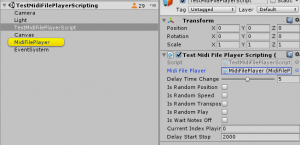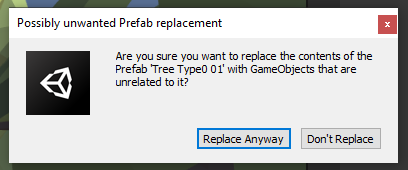

When you use the Editor, you can save data to ScriptableObjects while editing and at run time because ScriptableObjects use the Editor namespace and Editor scripting. Instead, you need to save them as Assets in your Project. A GameObject’s functionality is defined by the Components attached to it. Just like MonoBehaviours, ScriptableObjects derive from the base Unity object but, unlike MonoBehaviours, you can not attach a ScriptableObject to a GameObject The fundamental object in Unity scenes, which can represent characters, props, scenery, cameras, waypoints, and more. This means that there is one copy of the data in memory. Instead of using the method, and storing duplicated data, you can use a ScriptableObject to store the data and then access it by reference from all of the Prefabs. More info See in Glossary.Įvery time you instantiate that Prefab, it will get its own copy of that data.
#UNITY REFERENCE PREFAB SCRIPT IT ATTACHED TO CODE#
More info See in Glossary that stores unchanging data in attached MonoBehaviour scripts A piece of code that allows you to create your own Components, trigger game events, modify Component properties over time and respond to user input in any way you like. The prefab acts as a template from which you can create new object instances in the scene. This is useful if your Project has a Prefab An asset type that allows you to store a GameObject complete with components and properties. One of the main use cases for ScriptableObjects is to reduce your Project’s memory usage by avoiding copies of values.

Note while instantiating the object, don't forget to SetActive true.A ScriptableObject is a data container that you can use to save large amounts of data, independent of class instances. And since the object are is disabled in hierarchy it is not working but holding all the property of its prefab, just like the prefab itself. What basically we are doing here is instead of using prefab we are using object as a reference for instantiating objects. Set Active(true) the instantiated object.Now where ever you have code to instantiate the prefab originally, replace it with this Unpacked Prefab object from hierarchy.Disable the Unpacked Prefab in hierarchy.Now attach the references of other object to the script of Unpacked Prefab.



 0 kommentar(er)
0 kommentar(er)
